Pestle & Mortar Clothing launched an Olympic-inspired collection and it’s actually good

The official Malaysian Olympic attire has recently come under fire for being backward and uninspiring compared to previous attires of the national contingent.
If you’ve been disappointed by those fits, well, here’s one collection that’ll soothe your sore eyes.
Homegrown streetwear brand Pestle & Mortar Clothing (PMC) has teamed up with the Olympics Council Malaysia (OCM) to launch a special “Malaysian Pride” collection just in time for the 2024 Paris Olympics.
This lifestyle range embodies the Olympic spirit, encapsulating the powerful message of “Faster, Higher, Stronger—Together”, PMC said in a press release.
The initial conversation began when the clothing brand reached out to OCM, driven by their passion for sports and Malaysian athletes. PMC’s 360-degree lifestyle brand approach naturally includes sports, aiming to highlight inspiring Malaysian stories.
The unity that sports brings to Malaysians, along with the iconic symbols of the Malaysian flag and Olympic rings, sparked their inspiration.
“As no other Malaysian streetwear brand has ventured into this territory, we saw this prestigious event, which occurs once every four years, as the perfect opportunity to create something unique and meaningful.”
“We initiated discussions about this project last year, and the design process began early this year,” PMC co-founder Hugh Koh told Vulcan Post.
This collaboration aims to inspire and motivate, reflecting the values of perseverance, ambition, and collective strength, proudly showcasing Malaysia’s heritage on the world stage.
Celebrating Malaysian Olympians
The ‘Malaysian Pride’ collection is a tribute to Malaysian Olympians, celebrating their dedication and achievements while capturing the vibrant Malaysian spirit and pride.

“Sports have an incredible ability to unite people, and this collection is a celebration of those who represent us Malaysians globally,” Hugh added.
“We believe this collection will inspire our community and bring people together to support our athletes and the values they represent.”
To maximise reach, PMC held a media preview launch event, inviting media, key opinion leaders (KOLs), and friends of the brand. They also seeded personalities to further amplify the message of the collection.
As a special incentive, PMC will also give a limited edition Gemilang striped pin to customers who spend RM199 on the Malaysian Pride collection.
Exclusive and limited edition
The collection features eight exclusive items, including four t-shirts, one jersey, one polo tee, one coach jacket, and one cap. Each piece showcases dynamic graphics and designs inspired by the Olympic Games.
The collection will be available online at the Pestle & Mortar Clothing website and PMC’s flagship store in APW Bangsar, KL starting from July 18, 8PM onwards. At the time of the writing, we do not know the pricing and availability, so keep an eye on their website for updates.
“For the ‘Malaysian Pride’ collection, our goal is to embrace the PMC spirit and aim for a sold-out approach,” Koh explained.
“We want to spread our message to as many Malaysians as possible, but we’ve produced limited quantities, with an average of only 250 pieces per style. Our focus is on creating exclusivity for this special collection, so be sure to get your hands on them quickly.”
Dato’ Mohd Nazifuddin, Secretary General of the Olympics Council Malaysia, expressed his excitement about the collaboration.
“We are thrilled to collaborate with PMC on this special lifestyle Olympics collection. This collection not only celebrates our Malaysian athletes but also highlights the unity and pride of the Malaysian people.”

“Above all, we hope this collection speaks to sports fans who wish to identify with the Malaysian contingent, wherever they may be,” he said.
A step towards innovation
One challenge faced by PMC was aligning diverse creative visions, which they turned into an opportunity for innovation.
By fostering open communication and collaboration, they successfully blended different perspectives to create a cohesive collection.
PMC expect this collaboration to significantly enhance its brand’s recognition by associating with a prestigious national organisation.
The company also has a history of creating collections in the sports pillar, such as PMC x Sabah FC, PMC x Badminton Association Malaysia, and the World Cup-Inspired Collection, shared Hugh.
They are proud to have created an official Malaysian Olympics range, setting a precedent for future collaborations and further showcasing their ability to merge sport with streetwear fashion.
This collection is likely to inspire more innovative product collections and partnerships for PMC, while also encouraging other brands to pursue similar collaborations.
With the ‘Malaysian Pride’ collection, PMC aims to turn the tide, offering a fresh, inspiring take on national pride and unity.
- You can learn more about Pestle & Mortar Clothing here.
- Read other articles we’ve written about Malaysian startups here.
Also Read: Meet the startup that powers the backbone operations of over 7K M’sian F&B outlets
Featured Image Credit: Pestle & Mortar Clothing
M’sian startup behind the 1st local green vending ecosystem bags RM2mil investment
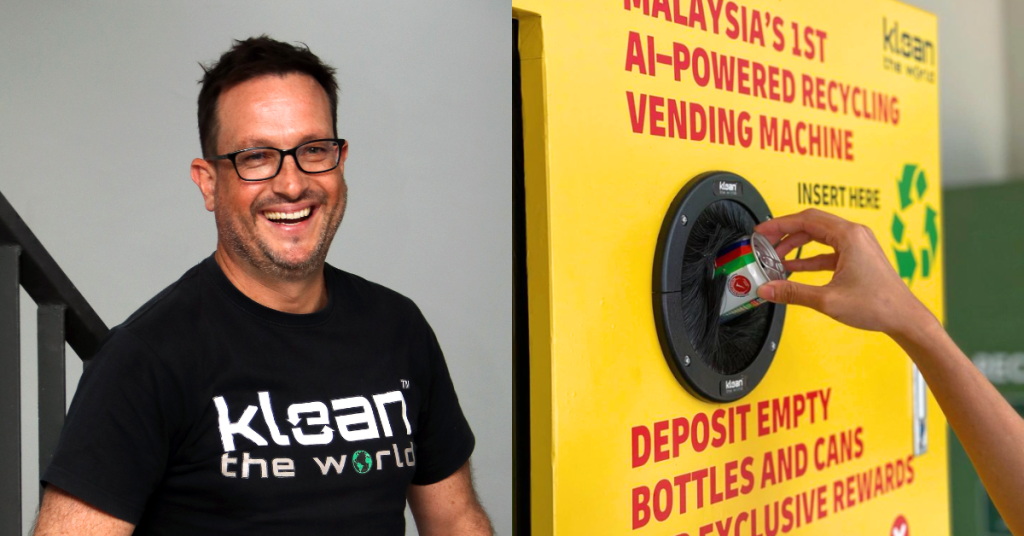
Ficus Capital (Ficus), the world’s first Islamic Environment, Social, and Governance (ESG-i) venture capital firm, announced today that they’ll be investing RM2 million into local green technology firm KLEAN.
Best known for establishing Malaysia’s first Reverse Vending Machine (RVM) ecosystem, KLEAN operates an AI-powered digital container deposit system. These can be found in publicly accessible areas like petrol stations and shopping malls.
Ficus’ new investment into this homegrown company will further support KLEAN’s initiatives in three main areas:
- Container recovery
- Network expansion of KLEAN’s RVMs
- Enhancement of its regional operations in Malaysia, Indonesia, Singapore, and Fiji
For context, RVM refers to a recycling machine that allows people to insert used or empty glass bottles, plastic bottles, or aluminium cans in exchange for rewards. In KLEAN’s case, the rewards are benefits like Grab vouchers and discounts on ETS train tickets.
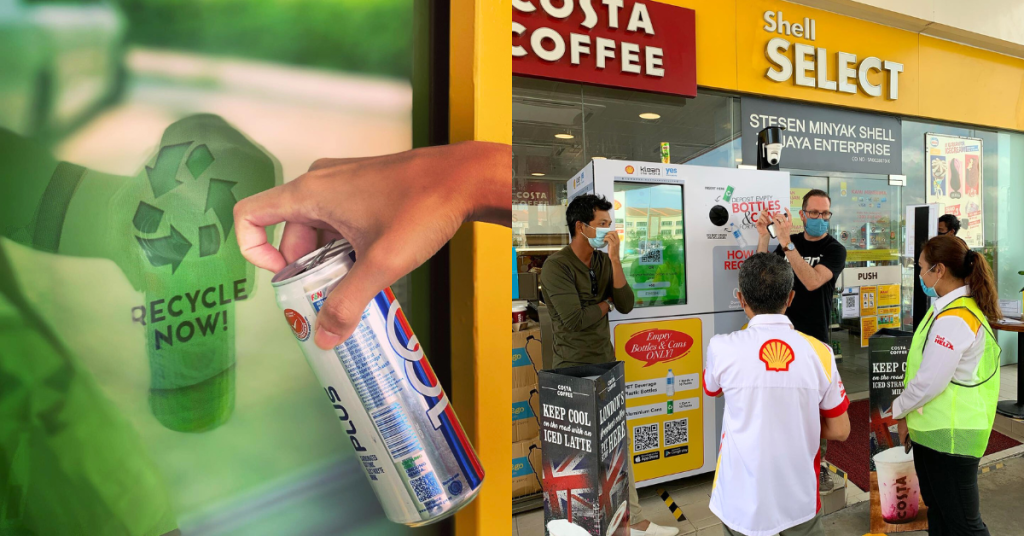
All you have to do is collect points by recycling. Each container deposited will earn you 10 points. The points you collect will be displayed on its KLEAN the World mobile app, where you can redeem the rewards.
KLEAN’s Smart RVMs uses its proprietary AI system that can recognise the brands and type of material of the deposited containers. This facilitates the process of sorting recyclables and optimises recycling operations.
But its value extends beyond that. “Our innovative technology also provides valuable data and insights, driving us closer to a cleaner, greener future,” KLEAN’s co-founder and CEO, Nick Boden, shared.
KLEAN produces detailed ESG data down to the container’s number, the demographic of recyclers, and popular recycling times. This data is then shared to its partners for reporting purposes and to improve their sustainability options.
Driving growth in the sustainability industry
“Ficus’ investment in KLEAN is a vote of confidence in the company’s future. This additional capital could be a major driver of our growth,” Nick stated in the press release.
“Their commitment to sustainable and ethical investment aligns perfectly with KLEAN’s mission, strategically enabling us to expand our network of RVMs and enhance our operational presence across the region.”
Ficus specialises in Shariah-compliant ESG investing, which resonates with KLEAN’s values. Their strong presence in Southeast Asia also complements KLEAN’s planned expansion into ASEAN markets.
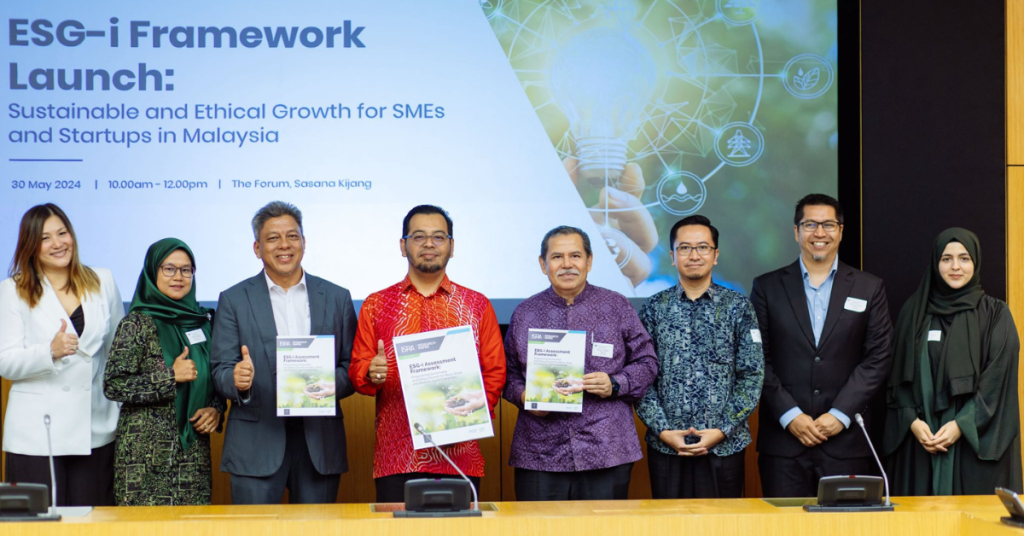
The RM2 million investment fund is backed by the Malaysian government through MAVCAP, which provides another layer of credibility and potential for future support.
The global green technology and sustainability market is reportedly projected to grow from US$19.83 billion in 2024 to US$83.59 billion by 2032, at a compounded annual growth rate (CAGR) of 19.7 percent. This is based on research done by Fortune Business Insights.
“As awareness of social and environmental issues continues to grow globally, so does the demand for sustainable investment options that align with ethical and religious values. The ESG-i sector stands at the intersection of these trends, offering investors the opportunity to make impactful and socially responsible investments while adhering to Islamic finance principles,” Ficus’ Managing Partner Abdullah Hidayat Mohamad, said.
At the time of writing, there are 100 RVM units across the aforementioned four countries, with the majority being in Malaysia. Through this investment, we hope to see more of these machines outside of the Klang Valley soon.
- Learn more about Ficus Capital here.
- Learn more about KLEAN here.
- Read other articles we’ve written about Malaysian startups here.
Also Read: 5 AI features in ASUS’ new OLED laptop & how they’ll benefit your productivity & gaming
Featured Image Credit: KLEAN
S’pore Quant Finance jobs pay more than London, NYC, here’s the math!

efinancialcarrers.com recently posted a report titled “Salaries and Bonuses in Quant Finance: broken down by role, seniority & region.” On the surface, this does not make for good reading if you intend to start a quantitative finance career in Singapore, with lower salary figures for Asia, but I did my research, and it turns out that the opposite is true!
Quantitative Finance is fast becoming one of the essential jobs in Singapore as we transition into a global financial hub. With Singapore attracting more family offices and wealth management firms, the need for qualified ‘Quant’ professionals has intensified, and they are amongst the highest-paid professionals in the finance sector.
| Position | Base Pay Lower Limit (US$) | Base Pay Upper Limit Limit (US$) | Total Compensation Lower Limit (US$) | Total Compensation Upper Limit (US$) |
| NORTH AMERICA | ||||
| Risk Analyst (Associate) | $80,000 | $100,000 | $90,000 | $110,000 |
| Quant Researcher (Associate) | $150,000 | $175,000 | $250,000 | $325,000 |
| Quant Developer (Associate) | $150,000 | $200,000 | $200,000 | $250,000 |
| EUROPE | ||||
| Risk Analyst (Associate) | $75,000 | $90,000 | $80,000 | $100,000 |
| Quant Researcher (Associate) | $125,000 | $150,000 | $200,000 | $300,000 |
| Quant Developer (Associate) | $100,000 | $125,000 | $120,000 | $150,000 |
| ASIA | ||||
| Risk Analyst (Associate) | $45,000 | $60,000 | $50,000 | $65,000 |
| Quant Researcher (Associate) | $95,000 | $125,000 | $165,000 | $185,000 |
| Quant Developer (Associate) | $70,000 | $100,000 | $80,000 | $120,000 |
Focusing on three entry-level/junior positions, the numbers indicate a pay disparity for the highly converted Quantitative Researcher (Associate) position in Asia, who will get 63 percent of the Base Pay (lower limit) of their North American counterparts and 76 percent of the Base Pay (lower limit) of their European counterparts.
According to the Total Compensation Upper Limit Column, an Asian-based Quantitative Researcher (Associate) may receive up to US$185,000 a year, 56 percent of their North American counterparts and 61 percent of their European counterparts.
This seems to justify the reasons why Singapore undergraduates interested in Quantitative Finance prefer to study in overseas universities. Mr Jonathan Lim, whom the Straits Times reported in February 2024 was heading to University College London to study Mathematics, felt that moving to London, one of the world’s financial capitals would make it easier for him to have a career in quantitative finance.
“In the quantitative finance field that I am interested in, London is one of the best places in the world to chalk up some work experience.”
Jonathan Lim
This seems an Interesting choice, as in the 2024 U.S. News Global University Rankings, the University College of London is the #7 Best Global Universities but ranks #39 in Computer Science and #64 in Mathematics. In contrast, the Nanyang Technology University (NTU) ranks #2 in Computer Science globally, while the National University of Singapore (NUS) ranks #3 in Computer Science and #43 in Mathematics.
Are these salary figures accurate in Singapore?
The report grouped Asia into a region, which means it could include jobs listed in Singapore, Dubai, South Korea, and Thailand, but do we have any Singapore-specific data?
I first checked Morgan Mckinley for its Singapore Salary guide for quant salaries and found these figures:
- S$160,000 (US$120,000) for 5-10 years of work experience.
- S$250,000 (US$186,418) for 10-15 years of work experience.
- S$350,000 (US$260,985) more than 15 years of work experience.
- Estimated average S$250,000 (US$186,418)
These figures align with eFinancalcareers, so I checked two job listing sites.
Indeed has the salary averages for two positions:
- Quantitative developer salary: S$118,174 (US$88,066) from 15 salaries reported.
- Quantitative analyst salary: S$129,014 (US$96,145) from 172 salaries reported.
Finally, we searched MyCareersFuture for fresh/entry-level positions and found 9 listings (at the time of this article) for positions starting at S$6,000 and S$8,000 per month, with the upper limit for a Junior Quantitative Researcher quoted at S$15,000/month (Master’s/PHD required), which is equivalent to US$134,141 per annum.
So yes, the eFinancalcarreers figures are accurate.
So why is there a pay disparity?
The simplest answer is different personal income tax rates and cost of living. Singaporeans pay a progressive income tax that is low compared to other countries.
I ran a comparison of estimated Income Tax using online tax calculators and a similar starting amount of US$100,000 (S$134,099). Note that I am assuming that Singaporeans working overseas will obtain Permanent Residency status, as this makes it simpler to calculate.
- An American Permanent Resident working in New York earning US$100,000 will take home US$80,526 after tax.
- A British Permanent Resident working in London earning US$100,000 (£ 76,905) would take home £68,561 (US$89,149) after tax.
A Singaporean earning US$100,000 (S$134,089) would take home US$92,494 (S$124,026) after tax.
Singapore has the highest take-home pay after tax for a US$100,000 equivalent salary. After-tax, someone in Singapore would take home US$92,494 compared to US$80,526 in New York and US$89,149 in London.
Finally, there are numerous other variables that you have to consider when moving overseas for a job, with living costs the biggest factor. For Quantitative Finance positions, we can assume that Singaporeans will seek to move to financial hubs, such as Zurich, New York, and London, which have high costs of living for expatriates. New York also has an 8.875 percent Sales and Use tax, while the UK has a 20 percent Value-added Tax (VAT).
Feature image: Shutterstock
Also read: Singapore Salary Guide 2024: Why Banking & Finance Careers Remain Hot
Bringing something new to KK’s cafe scene, this Sabahan decided to open his store in a gym
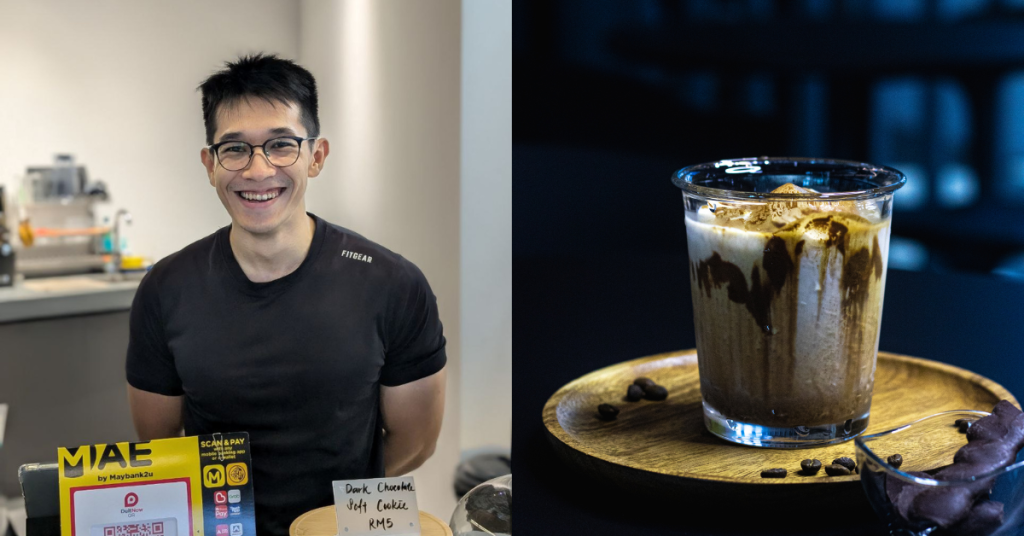
Especially for non-gymgoers, it might not ever occur to you to visit a café inside a fitness centre. At least, that’s the case for me, as someone who does not consider gyms as a place to lepak in.
However, Kota Kinabalu native Alvin decided to take on the challenge by opening up his own café, nestled inside a gym by the name of Kyros Fitness.
And no, it’s not designed to just attract fitness junkies. More on that later.
Alvin has gotten his fair share of experience with cafes while living in KL, but today he’s stationed in Kota Kinabalu where he works for his parents’ business. Of course, he’s also double-hatting as the founder of his own café, Yawny Space.
“This would be my first business in F&B,” he shared. “I started being interested in specialty coffee five years ago during the pandemic and decided to try my hand in it after doing it for myself at home.”
Alvin admitted that Yawny Space, being a part-time commitment of his at the moment, is mainly just him “trying to see if it’ll work out”. Despite the humble ambitions, he invested RM70,000 of his own savings into the business and opened up shop in March this year.
A yawny area in a high-energy space
The location, of course, is rather different.
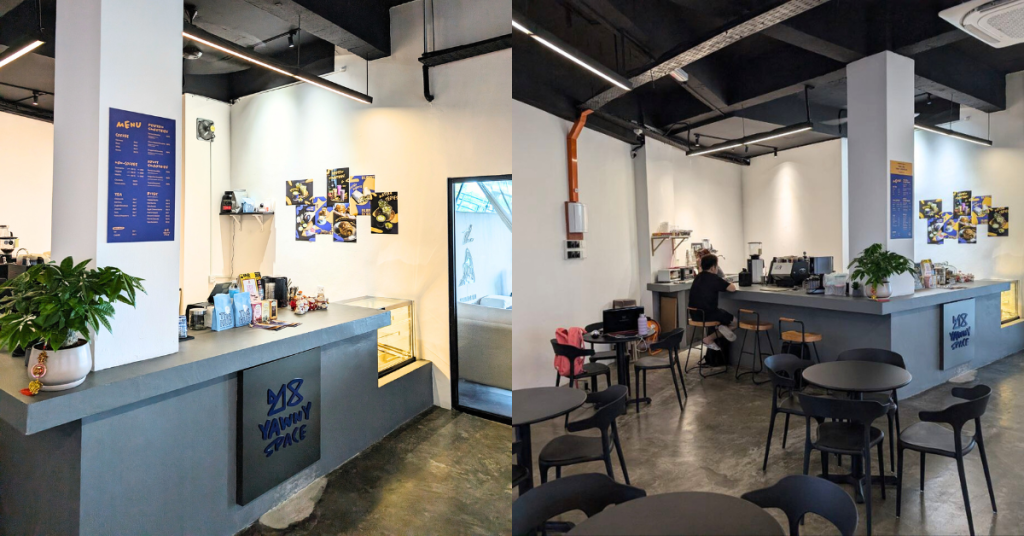
“The owner of Kyro Fitness, who is a friend of mine, wanted to have a cafe space inside the gym, and he approached me,” Alvin explained. “I thought that this would be an interesting thing to try and decided to just go for it.”
So, to clarify, Yawny Space and Kyro Fitness are run by different operators, whereby Alvin is essentially renting the space from them.
He dubbed the business Yawny Space, obviously a nod to how coffee keeps people awake on the verge of falling asleep.
Not just for gym junkies
Catering to the gym crowd, Yawny Space does offer a range of protein shakes and healthy options such as cold pressed juices.
“But we also wanted to have other options for people who are, let’s say, waiting for their partners to finish working out, or taking care of the kids while waiting, etc.,” Alvin pointed out.
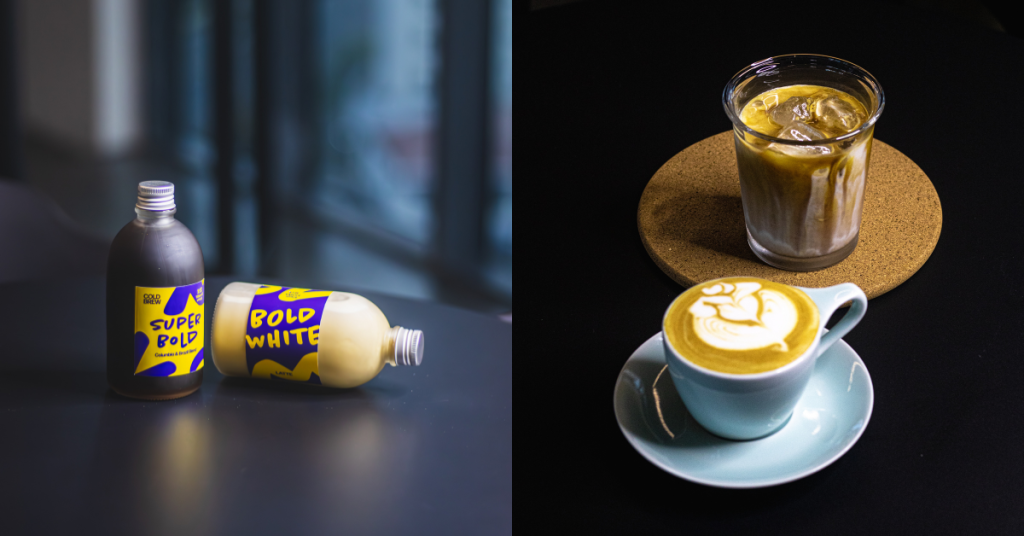
Although the team is actively trying to welcome a broader demographic, Yawny Space’s current demographic is mostly still members of Kyros Fitness.
This aligns with the fact that a big challenge of theirs is visibility, or a lack thereof. Since Yawny Space is located inside another venue, it doesn’t get much foot traffic. This is exacerbated by the fact that there isn’t actual signage on the building for the café.
To really appeal outside of their regulars, Yawny Space has developed quite a suite of unique beverages such as their Black Sesame Lattes (also called “Cement” Latte) and Orange Fizzy Espressos.
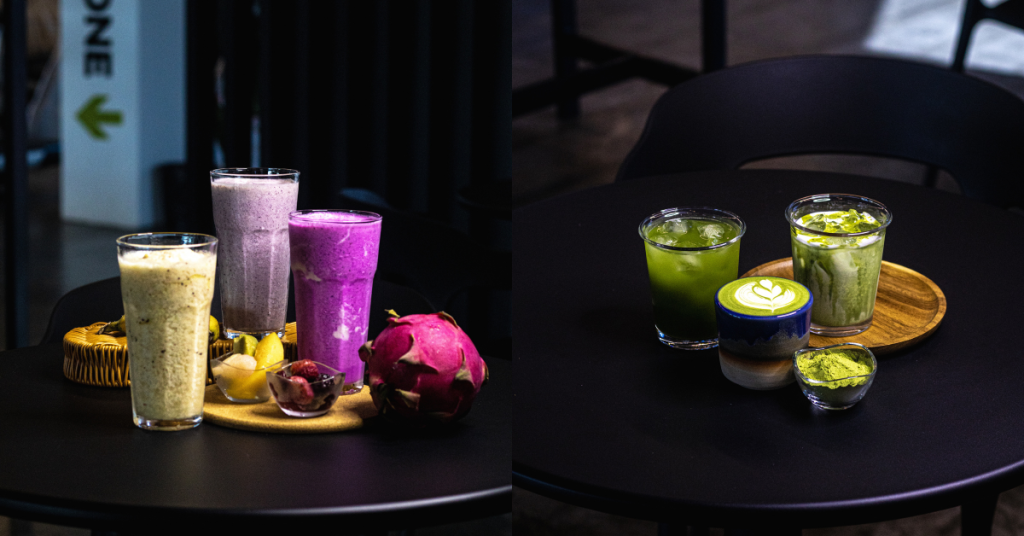
They also sell some hot foods, such as beef and chicken pies, chicken burritos, and a variety of pastries. These are outsourced from friends of the business since they do not have a fully equipped kitchen.
“We’d like to think that we can also offer this space for people who just want to try their hand at pastries/baking, as a platform for them to sell too,” Alvin added. “So far it seems like people love the cookies.”
Slow, small, and steady
At the time of writing, Alvin said that the reception for Yawny Space has been “alright”.
“Business could be better as well but we know it’s a difficult path,” he mused. In any case, he’s happy to report that they’ve been able to ensure that staff members aren’t going without pay—a small but commendable feat for a budding business.
According to Alvin, the café culture in Sabah is moderate, though he finds that café-hopping tendencies seem to have calmed down over the years.
“We think it’s difficult to come into this market with so many great cafes already out here, but we hope we can bring something different too,” he admitted. “This is why we started out in a gym and thought it was a new idea for KK.”
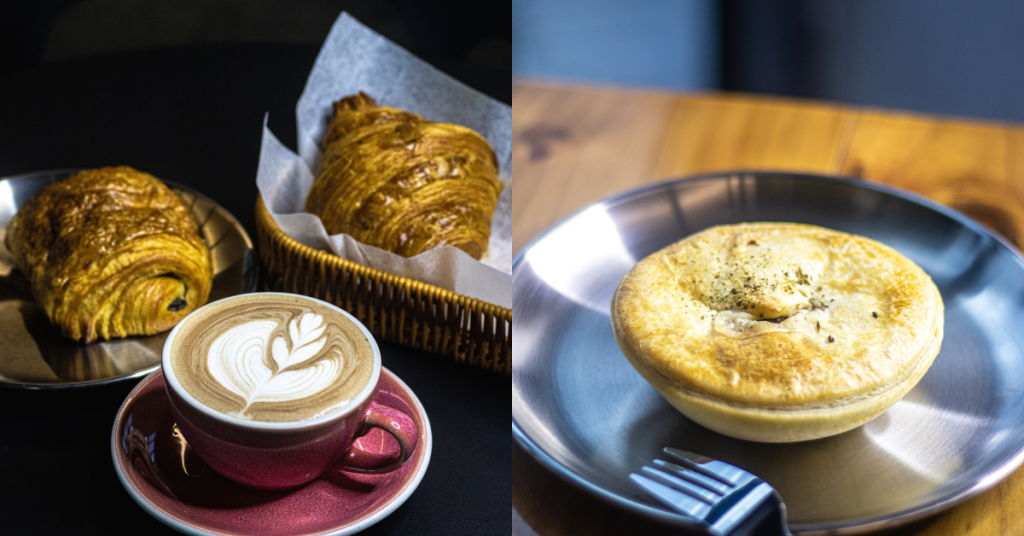
Alvin does intend to keep the business small for now, properly serving the community instead of jumping the gun with expansion plans.
In any case, it’s only been three months or so since Yawny Space’s inception, so there’s still plenty of room (and time) for growth.
Also Read: This agritech solution by UiTM & TechnoDex aims to boost food security & empower B40 farmers
Featured Image Credit: Yawny Space
This M’sian gave up a career in finance & HR to open her own chiffon cake bakery in PJ
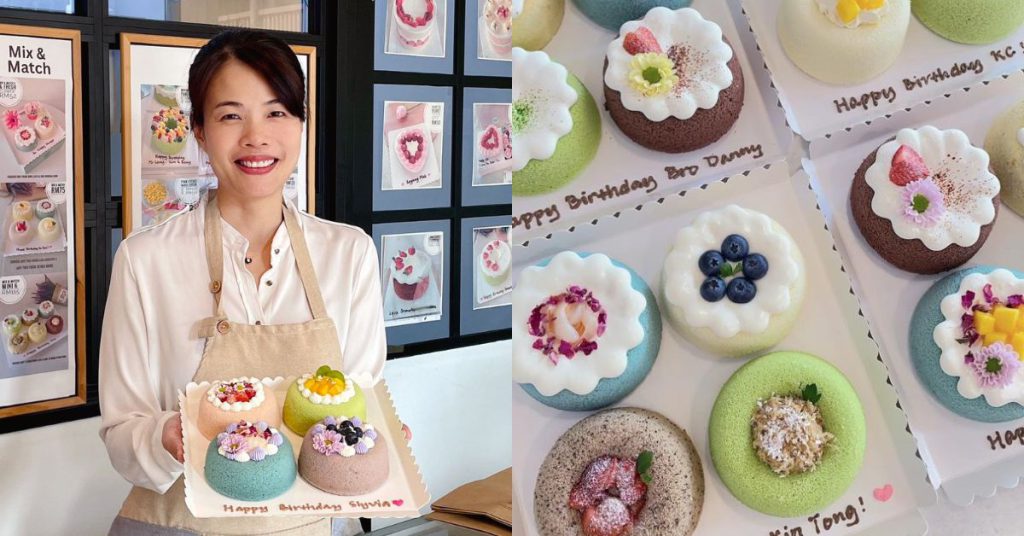
For many, the corporate world offers a clear path to success—climb the ladder, secure the corner office, and reap the rewards.
But for Renae, the allure of boardrooms and spreadsheets eventually gave way to the sweet aroma of freshly baked chiffon cakes.
Renae spent years in the corporate world. She was a regional head of Finance and HR, based in Kuala Lumpur. She covered Malaysia, Singapore, Hong Kong, Taipei, and Beijing, during her job. Her work life was a whirlwind of travel, stress, and challenges, yet it was an experience she cherished.
Amidst the corporate hustle, baking with her son became a hobby and a way to de-stress. Together, they baked everything from bread to cakes, nurturing Renae’s long-held dream of owning a bakery.
In 2019, Renae made a life-changing decision: she quit her corporate job to pursue her dream full-time.
The inspiration for Pandanese came after tasting the renowned pandan chiffon cakes in Singapore when she travelled for her work.

“My ex-colleagues told me they have the best chiffon cakes in Singapore, it’s like their national cake,” she told Vulcan Post.
And everything changed on that trip. There, she bit into a Pandan Chiffon cake that wasn’t like anything she’d ever tasted before.
The cakes were a revelation—moist, flavourful, and made with natural ingredients like fresh pandan juice and coconut milk. Unlike the airy, dry, and artificial chiffon cakes Renae was used to, these cakes were a cut above, though they came with a hefty price tag of S$13-15 (around RM40).
“It is also famous among tourists, with Bengawan Solo being the market leader and available in Singapore’s Changi Airport. I do not see this trend in KL,” she noted.
Seeing an opportunity in Kuala Lumpur, where such premium chiffon cakes were absent, Renae began her journey.
Encouraged by a CNN article that highly rated pandan chiffon, she spent six months perfecting her recipe through rigorous R&D.
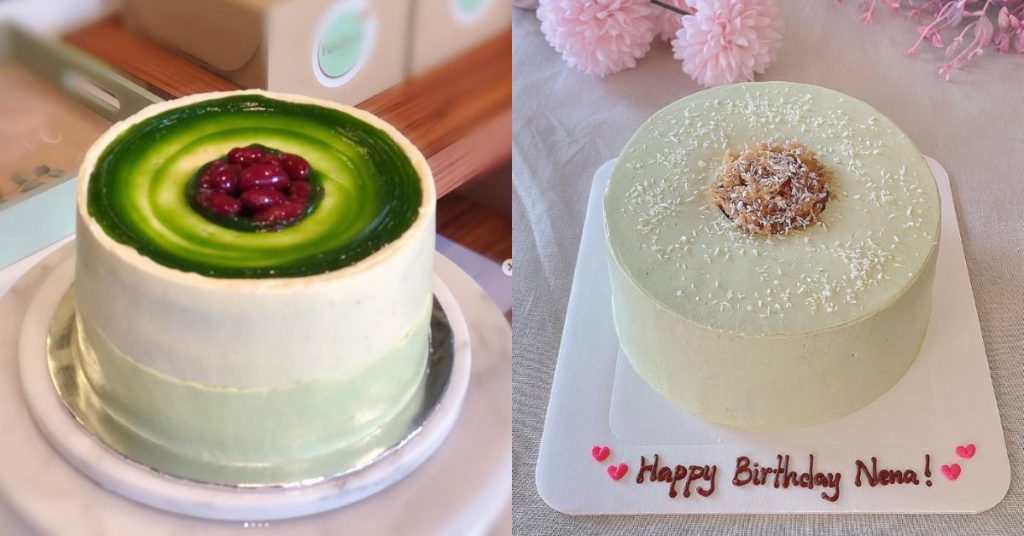
In May 2020, she launched her first order, baking from home. Her son suggested the name Pandanese, and it stuck, perfectly capturing the essence of her venture.
Filling the gap in the F&B scene
Pandanese aims to fill a unique niche in Malaysia’s saturated F&B industry by specialising in premium chiffon cakes made with quality, natural ingredients.
“It was challenging because I started selling a plain one at RM30 for an 8” big cake, while the market was selling approximately at RM10 or less for half my size,” Renae explained.
Convincing customers of the value of her cakes took time, but they soon returned, appreciating the natural taste, less sweetness, and moist texture of Pandanese’s offerings.
The cakes at Pandanese are crafted with natural flavourings like fresh pandan juice, fresh orange juice with zest, lemon, and blue pea water for the popular pastel blue lychee cake.
Renae moved from home baking to a proper shop in Petaling Jaya in September 2020, needing more space and equipment to meet growing demand and expand her product range.
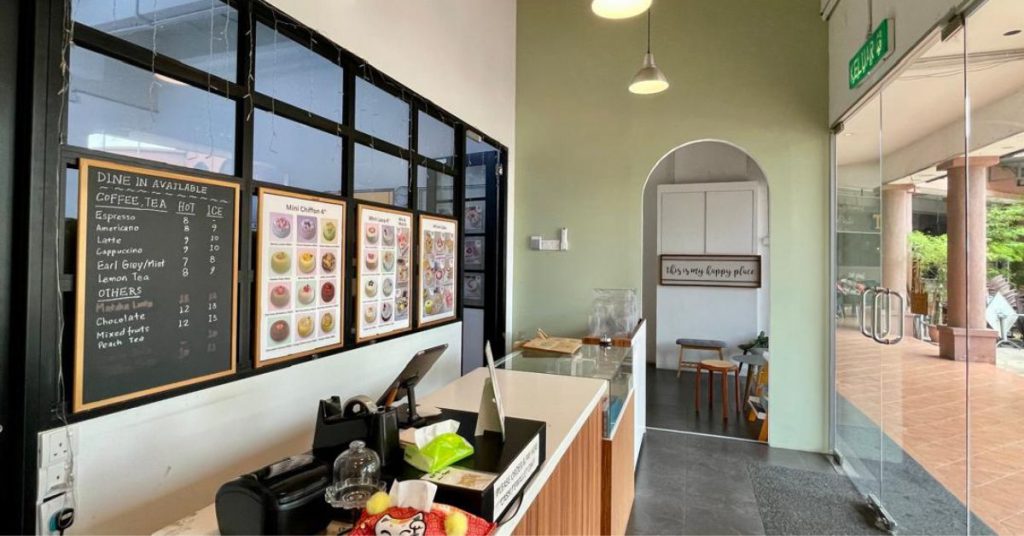
From plain chiffon cakes to birthday cakes and mini chiffons, Pandanese now offers a variety of over 10 flavours.
The mini chiffon cakes, slightly bigger than a doughnut, have become a bestseller. Customers love their cuteness and the variety of flavours available in gift boxes.
For birthday cakes, Renae uses chiffon as the base, fully frosted or half-naked to meet different preferences.
Popular flavours include pandan, lychee, Earl Grey, strawberry, chocolate, and mango.
“Our cakes are always quoted as so cute, so beautiful, not sweet, fresh, moist, natural, too cute to be eaten,” Renae said with a smile.
She constantly improves the cakes, ingredients, packaging, and services, ensuring Pandanese remains—if not the only specialised chiffon cake shop in Kuala Lumpur or Malaysia—a go-to for chiffon cakes.
Adapting to trends and customer needs
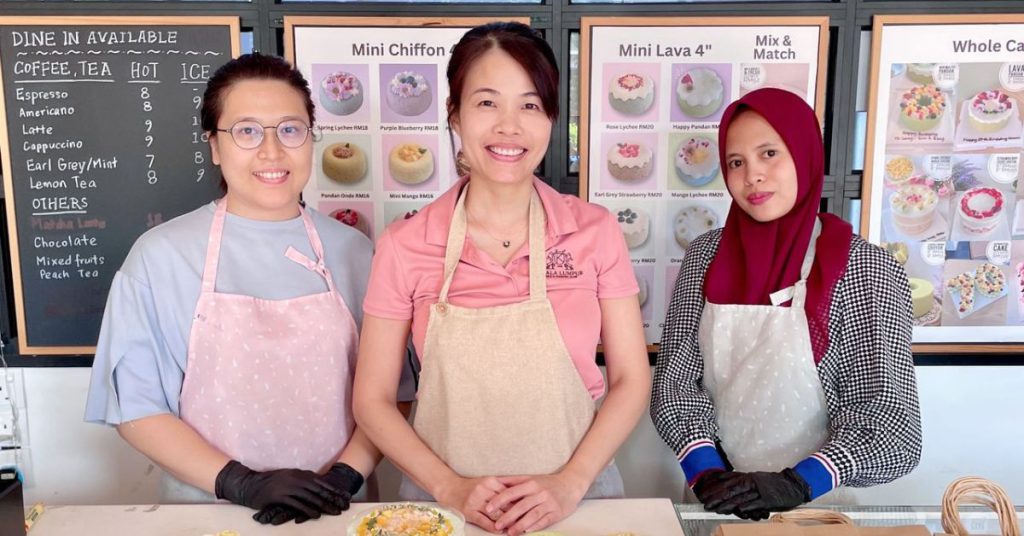
Over the past four years, Pandanese has shifted focus from solely online sales with delivery to welcoming more walk-in customers and offering a cosy dine-in experience in Petaling Jaya.
Starting with two workers, Renae now employs three, keeping up with the demand.
The trend has evolved from whole cakes to gift boxes containing mini cakes in various flavours. “Mini chiffons are available in individual boxes or gift boxes that can contain two, four or six mini chiffons,” she noted.
Despite the popularity of gift boxes, whole cakes remain highly sought after, and bulk orders for mini chiffon as corporate gifts are common.
“The biggest order to date was to produce 220 mini chiffon for a private school as a gift to their teachers and staff.”
“I have also created many designs and different versions for festivals like CNY, Christmas and Raya, and for occasions like Valentine’s, Mother’s Day, and Father’s Day,” she said.
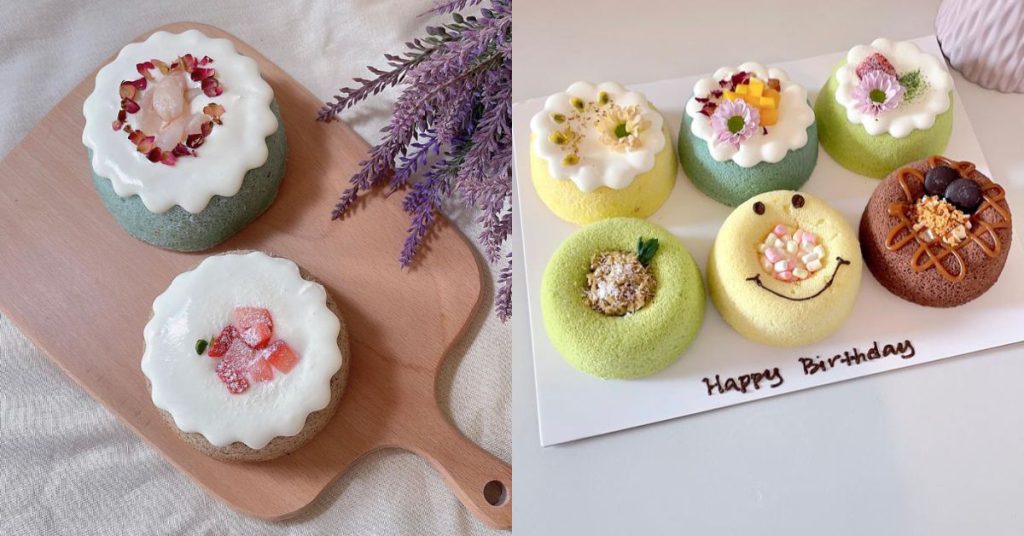
Maintaining quality and consistency is crucial as production scales up. Renae combines machine and handmade processes, ensuring each cake’s texture is perfect.
“Chiffon cakes are very sensitive to heat; we monitor the baking time and temperature closely,” she explained.
Renae stays abreast of consumer trends through social media, drawing inspiration from Korea, Japan, and China.
Her R&D process involves experimenting with flavours, shapes, textures, icing, fruits, and decorations. Sometimes, customer requests spark new creations.
The pastel colours of her cakes are a happy accident, resulting from using natural ingredients. “When the flavouring agent is natural, the colour of the cake becomes lighter in shade, hence the pastel shade,” Renae explains.
Challenges and growth
“It was very costly when I had to buy quality ingredients and packaging in low quantities in the beginning,” Renae recalled.
Over the years, prices for ingredients and packaging have risen, pushing Renae to drive sales and order in bulk to be cost-effective.
She runs campaigns on Grabfood, offers discounts on her website, and regularly updates social media to improve visibility. A feature by Malaysia Food and Travels (MFT) in 2023 brought in more followers and new customers, she said.
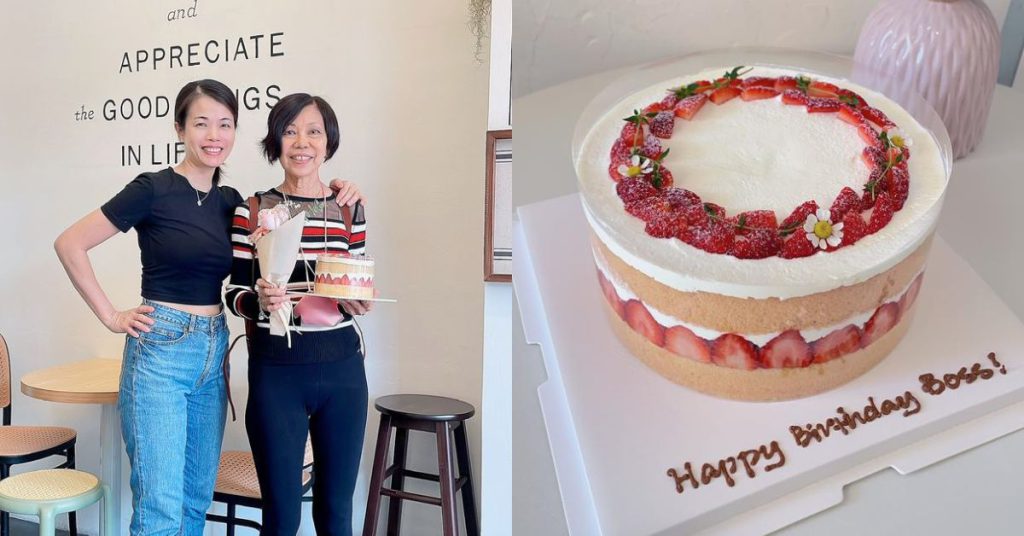
Renae’s advice for aspiring entrepreneurs is simple yet powerful. She emphasises finding passion in your work and persevering through challenges.
“It is important to identify your USP in the products you want to sell to sustain. Do not compromise the quality, be realistic with your customers, and do not over-promise,” she added.
Content with the current position of Pandanese, Renae prioritises work-life balance and has no immediate growth plans.
Pandanese, with its focus on quality, natural ingredients, and customer satisfaction, has carved a sweet niche in the F&B scene.
- You can learn more about Pandanese here.
- Read other articles we’ve written about Malaysian startups here.
Also Read: 5 AI features in ASUS’ new OLED laptop & how they’ll benefit your productivity & gaming
Featured Image Credit: Pandanese
He was so in love with Greek doughnut balls that he opened a Subang cafe specialising in it
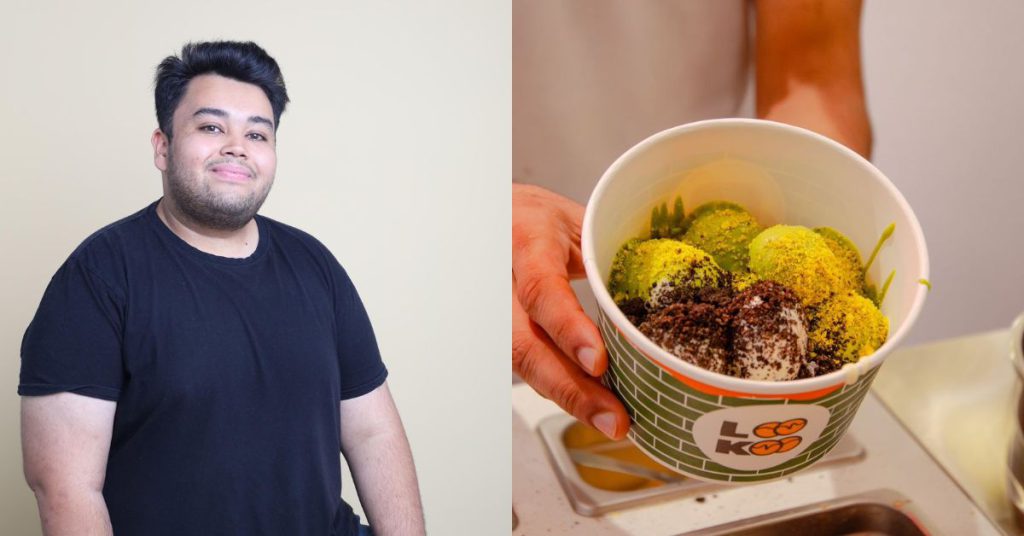
When you think about doughnuts, the first image that probably pops into your mind is a classic ring, perhaps dusted with sugar or glazed with chocolate.
But Harith Aqil, 25, the founder of LOOKOO, is here to change that perception.
LOOKOO, located in SS15, Subang Jaya, introduces Malaysians to the delightful world of doughnut balls, a concept that Harith discovered and fell in love with during his time in Melbourne, Australia.
A journey of discovery
After working as a regional marketing executive at F&N for a brief nine months in 2020, Harith explored various ventures.
From brokering deals in the medical industry with his company Hasy Enterprise during the COVID-19 pandemic to dabbling in property sales and selling reconditioned cars, Harith’s entrepreneurial spirit was always alive.
But it wasn’t until 2022 that he decided to settle down with a more permanent venture—LOOKOO.
The concept of LOOKOO was inspired by Harith’s time in Melbourne, where he first encountered the idea of doughnut balls drizzled with various sauces and toppings.
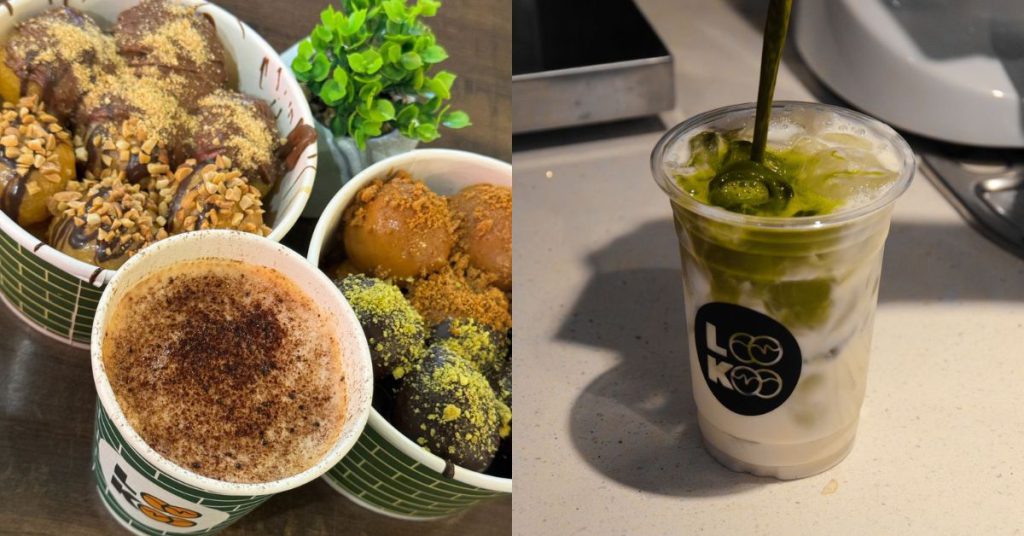
Intrigued by this delicious treat and recognising Malaysians’ love for sweet things, he decided to bring the concept back home.
“I started LOOKOO alone and then after a month, I brought along my childhood best friend, Gurrsimrath Singh, 26, to help me mainly with the accounting side. I handle the operations side.”
“Last year, my wife, Putri Toahira, also joined me in the business,” he told Vulcan Post.
A sweet treat with a history
Loukoumades (pronounced loo-KOO-mah-des) are a popular Greek dessert with a long history.
Did you know they date all the way back to the first Olympic Games?
People believe that when the Olympians were victorious, they were rewarded with “honey tokens”. These were bite-sized fried dough balls topped with honey, also known as loukoumades.
Not only that, ancient Greeks enjoyed these doughnut balls during celebrations and religious ceremonies.
Although the sweet has Greek origins, people have passed down and adapted recipes throughout Turkey, Egypt, Persia, and Italy.
LOOKOO decides to serve these fried doughnut balls with a modern twist.
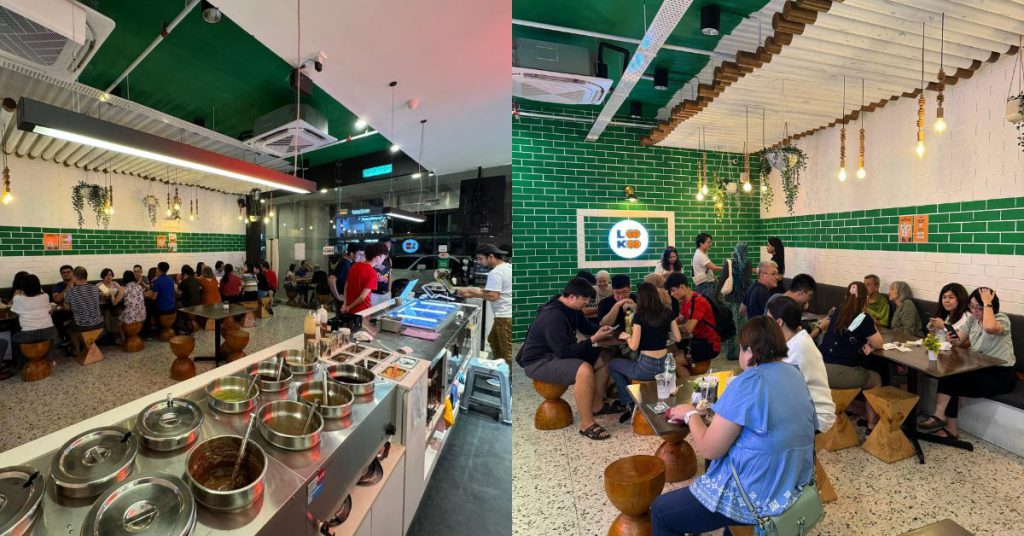
Instead of the traditional loukoumades which typically use a simple glaze such as honey and syrup, LOOKOO offers a wider range of sauces that resonates well with Malaysians’ palate.
The brand understands that while tradition is important, offering a modern twist on a classic can be a winning strategy.
The name LOOKOO itself is a clever nod to the Greek origin of the doughnut balls.
“We Malaysians like to do short-form things,” Harith said with a chuckle. “So I decided to call it LOOKOO. And the reason why it’s two O’s is because if you look at our logo, the two O’s are actually doughnut balls with sauce on top.”
When LOOKOO started, an international brand called Lukumades was the only one offering the same concept in Malaysia. Now, they aren’t the only players in the loukoumades game. Tealive has recently jumped on the trend with their own doughnut ball variations.
However, LOOKOO’s focus on customisation probably makes them a strong contender in the market.
The LOOKOO experience
Walking into LOOKOO, you’re immediately greeted by the aroma of freshly made doughnut balls and the sight of a cosy, welcoming space.
The menu at LOOKOO is simple yet innovative. The star of the show is undoubtedly the doughnut balls, available in portions of six, eight, or ten pieces.
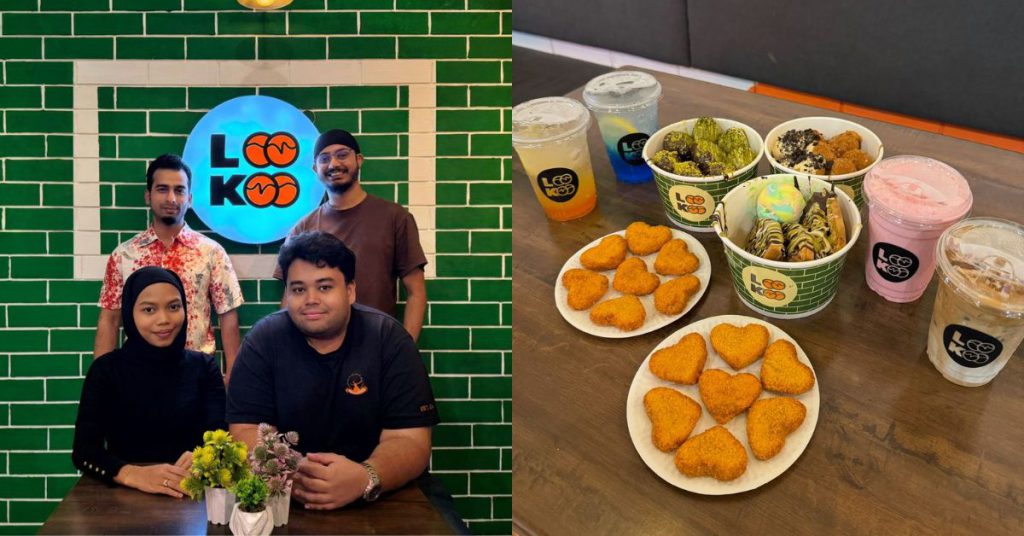
Harith, along with his wife, best friend, and staff, Farooq Qureshi, tirelessly perfected the recipe to achieve the perfect balance—crispy on the outside, fluffy on the inside.
Customers can choose from a variety of sauces and toppings, creating their own unique combinations.
This level of customisation sets LOOKOO apart from traditional doughnut shops, where toppings are usually pre-selected.
LOOKOO offers a selection of “modern” sweet sauces and toppings like Nutella, matcha, hazelnut, Lotus Biscoff, Oreo, rainbow sprinkles and more. This caters to the Malaysian sweet tooth and keeps things interesting for customers.
In addition to doughnut balls, LOOKOO offers a variety of drinks, including milkshakes made with their own ice cream, coffee, teas, sparkling drinks, and regular canned beverages.
Recently, Harith added waffles to the menu to provide more options for returning customers. Light snacks like chicken nuggets, sausages, and fries are also available, ensuring there’s something for everyone, not just for sweet tooths.
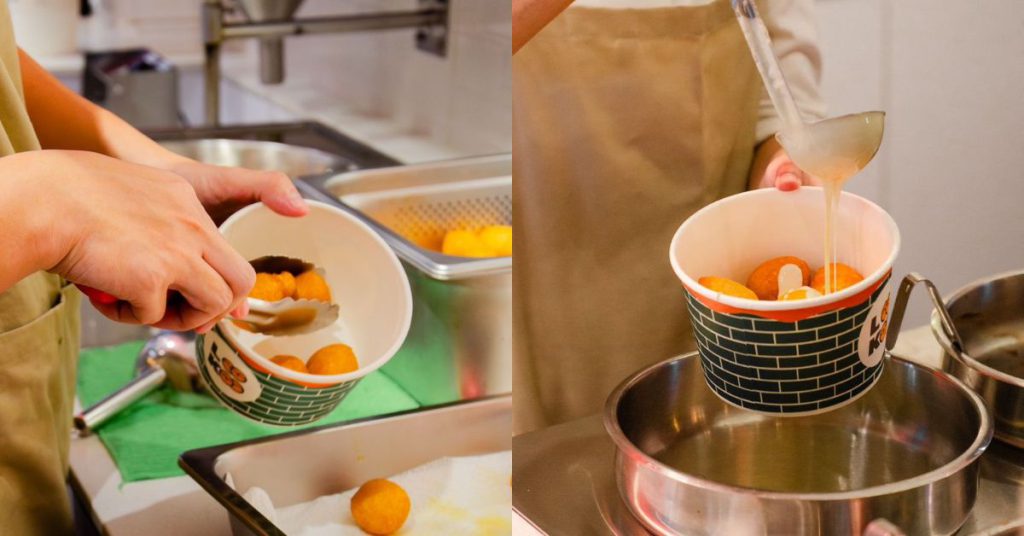
Sweetening the deal by overcoming challenges
Starting a new business always comes with its challenges, and LOOKOO was no exception.
Educating the market about doughnut balls and building brand awareness were significant hurdles. But Harith’s determination and innovative approach paid off.
Initially, customers were unfamiliar with the concept. “A lot of people thought it was taro balls, cekodok or even cakoi,” he said.
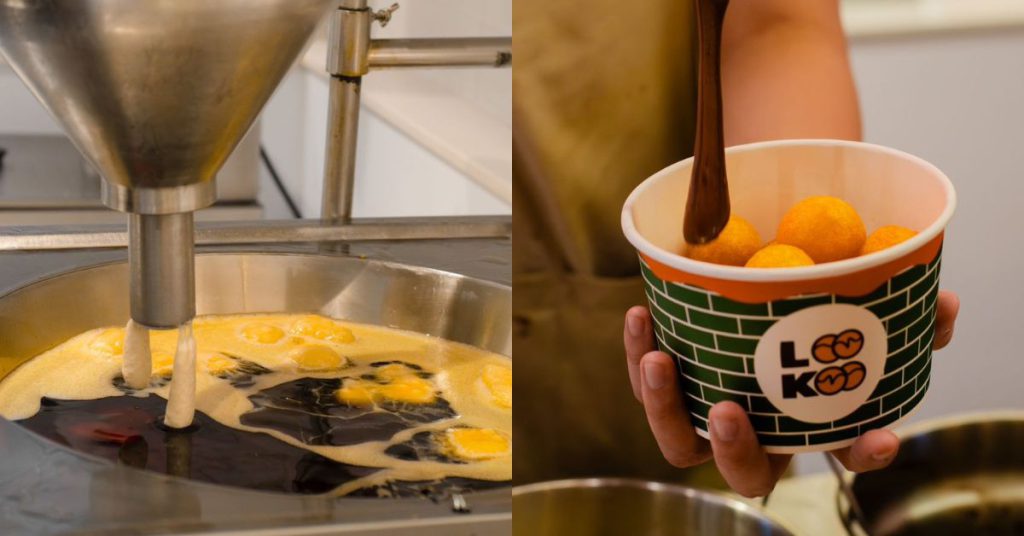
Harith’s witty explanation of “We are the missing hole of the doughnut ring” helped break the ice and introduce people to the world of loukoumades.
Plus, by offering customers the chance to try sauce and topping combinations before purchasing, LOOKOO created a unique selling point that resonated with many.
A growing presence
Since its inception, LOOKOO has seen a steady growth in popularity.
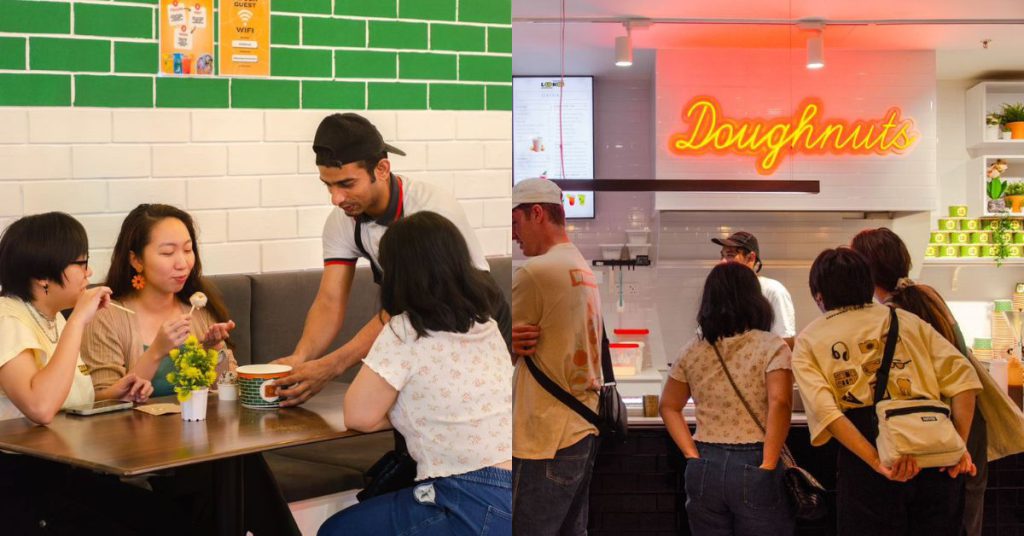
Located beneath an apartment complex near INTI College, LOOKOO attracts a diverse clientele.
While the student population contributes to the foot traffic, Harith notes that most of his customers are young adults to working adults. They also offer 10% discounts for university students to attract more people.
LOOKOO is also available on food delivery platforms like GrabFood, foodpanda, and ShopeeFood.
“Delivery has helped broaden our reach. In one month, the delivery orders are about 25% of our sales. A very big percentage of the 25% is on GrabFood,” Harith acknowledged. “I heard people from Petaling Jaya and even Shah Alam also order from us.”
Harith has big plans for LOOKOO. In addition to continuing to perfect and expand his menu—he plans to work on savoury flavours due to customers’ suggestions.
He also hopes to grow the brand within Klang Valley and eventually nationwide. Franchising is on the horizon too, with his ultimate dream being taking LOOKOO international.
Harith’s innovative approach and dedication to quality and customer experience ensure that LOOKOO is not just another dessert shop—it’s a sweet revolution.
- You can learn more about LOOKOO here.
- Read other articles we’ve written about Malaysian startups here.
Also Read: 5 AI features in ASUS’ new OLED laptop & how they’ll benefit your productivity & gaming
Featured Image Credit: LOOKOO
“Not the life I envisioned”: This M’sian quit corporate to grow her lemongrass chili oil biz
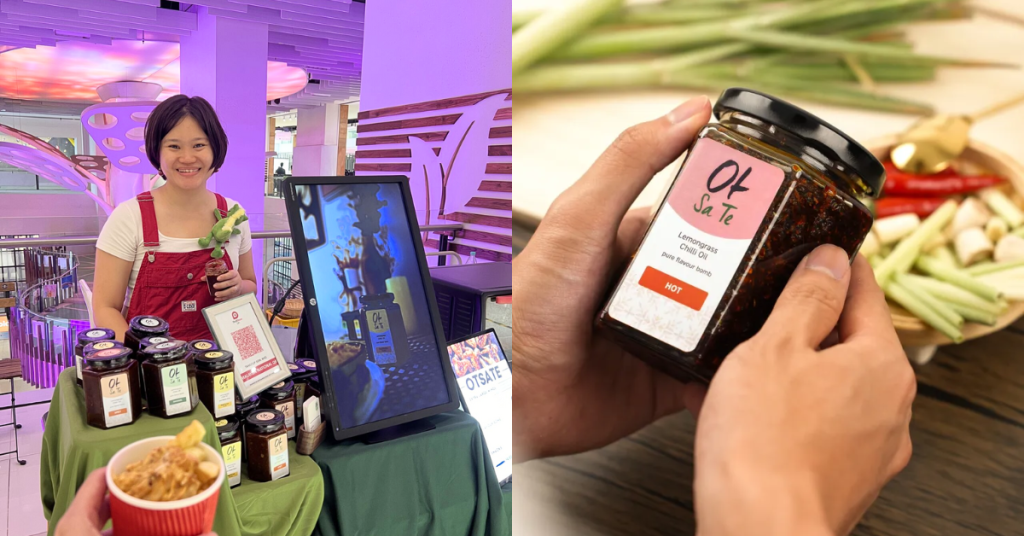
Eunice Yin Ern is someone who personifies being a lifelong learner.
For a decade, she was working in social media marketing. But outside of her corporate role, she took on various “side quests” for things she found interesting. Most of these didn’t make much monetarily, but they made up for it in terms of experience.
For one, Eunice was actually a part of Malaysian Pay Gap. And she’s even served 700 cups of waffles at a big corporation, which made her RM300 for two days of labour.
The first F&B business she started was called tangcup, which was all about selling soup in cups, like you would coffee.
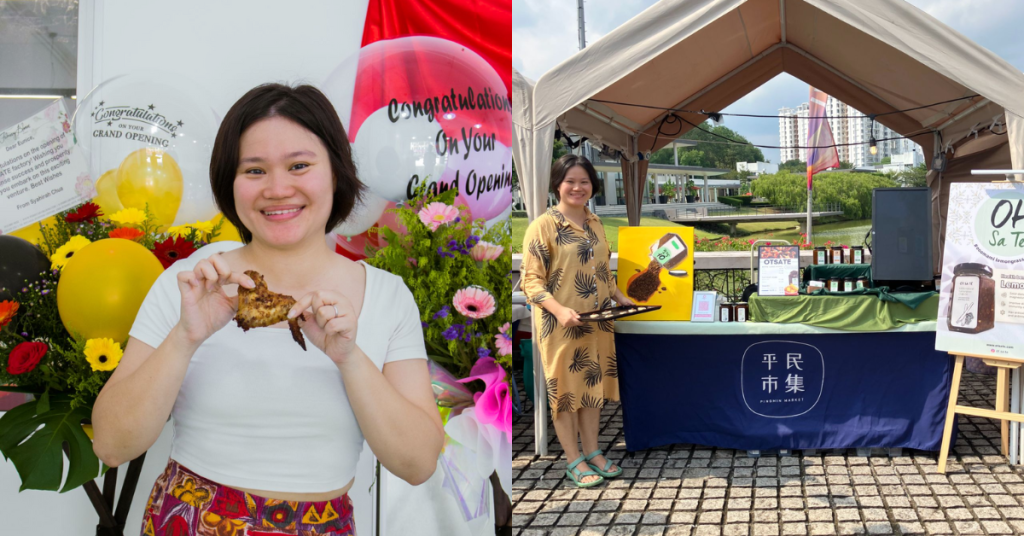
And now, she is also the founder and managing director behind Otsate, a lemongrass chili oil brand, which sold for the very first time in November last year.
The thought has never crossed her mind to do entrepreneurship full-time, though. It’s always just for fun, with no pressure of having to push for revenue.
But just last month in June, Eunice decided to take on the task of becoming a full-time entrepreneur. This is her story.
It started as a fun experiment
After getting married, Eunice found herself cooking dinner every single day for her and her husband. Because of her increased frequency of cooking, she started getting very experimental with her recipes, often trying new flavours and plating styles.
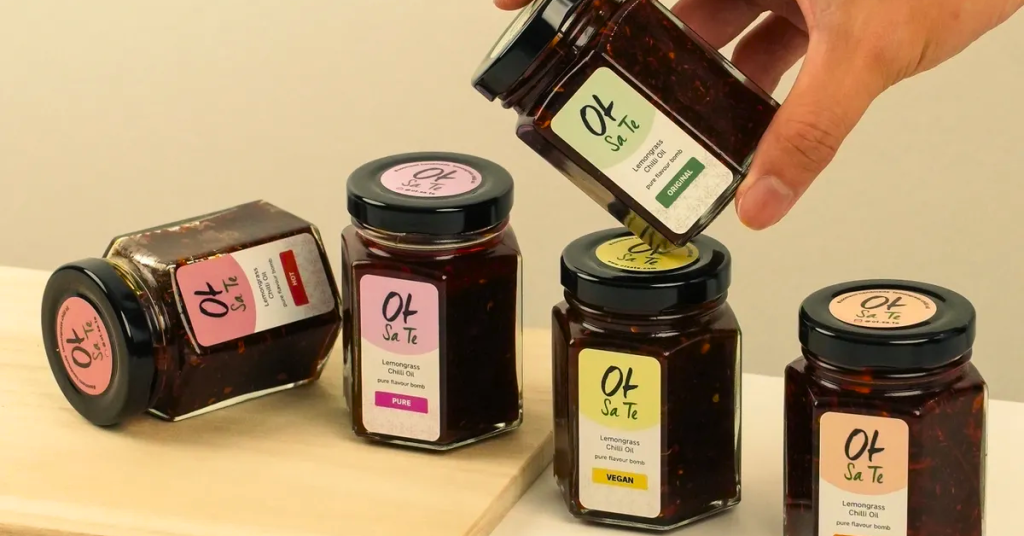
So, one day, she decided to shred the bulb of some lemongrass, process it, then stew it. The resulting sauce could be used as a type of fragrant garnish.
But when friends came over and tried it, they told her to sell it. This encouragement came from so many different friends that eventually, Eunice realised there was truly a willing audience for her lemongrass product.
One of them was Prestine, the founder of Malaysian Pay Gap. She was organising a picnic event at the time and invited Eunice to start selling her products there.
But many things have changed since then. She now has five different products—the original version with fish sauce, a vegan option, two spicy options, and a version without garlic and shallots.
Becoming a full-time entrepreneur
But the question remains, when and why did Eunice decide to trade her corporate job for full-time entrepreneurship?
It was December last year that the thought to make the shift started. Eunice was honeymooning in Taiwan when an urgent order for five jars came in. At that time, she had three jars at home, and two in her old place.
So, she began coordinating Grab Express to get the jars consolidated in one spot, then arranged for it to be sent to the customer. All the while, she was in Taiwan.
“This is not just for fun anymore, there are actually people who want to buy it,” she realised.
The moment she got back, she began making a new batch then sold to the public for the first time. Before this, her customers were mainly friends and people she knew.
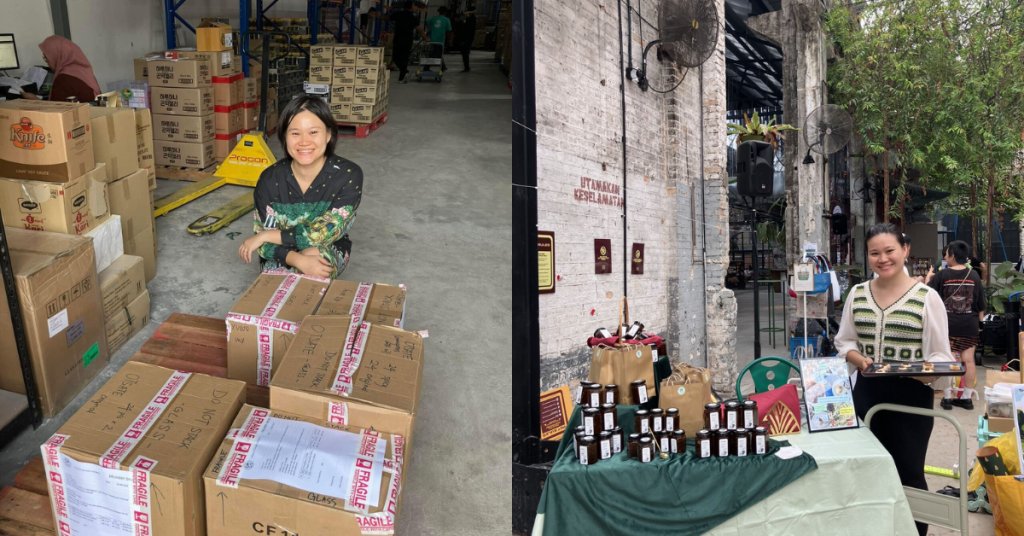
So, in January, Eunice went all-in with pop-up efforts. She decided she would resign in March, but it wasn’t an easy choice.
As she put it, there was a lot of internal struggles and turmoil.
“Because I’ve been in corporate for 10 years, I would never imagine myself leaving corporate to pursue entrepreneurship full time. It’s very scary,” Eunice expressed. “Now, I have zero income and zero salary, and my bank account is just draining because all my money is going into Otsate.”
But if it fails, she could always go back to her corporate career. An opportunity to grow a business does not come easy, so given the demand for Otsate, Eunice took the leap of faith.
Many learning curves
Of course, there have been many struggles along the way.
For one, Eunice’s products were priced too low, so much so that other vendors and entrepreneurs would advise her to increase the price. She recalled being ask what her margin was, to which she asked, “What is margin?”
Eunice is also struggling with cash flow because some products are being listed on a consignment basis. That means until they’re sold by the convenience store, she won’t be receiving any payments.
The fact of the matter is that Eunice could push for sales in many different avenues, such as online. But there’s a problem.
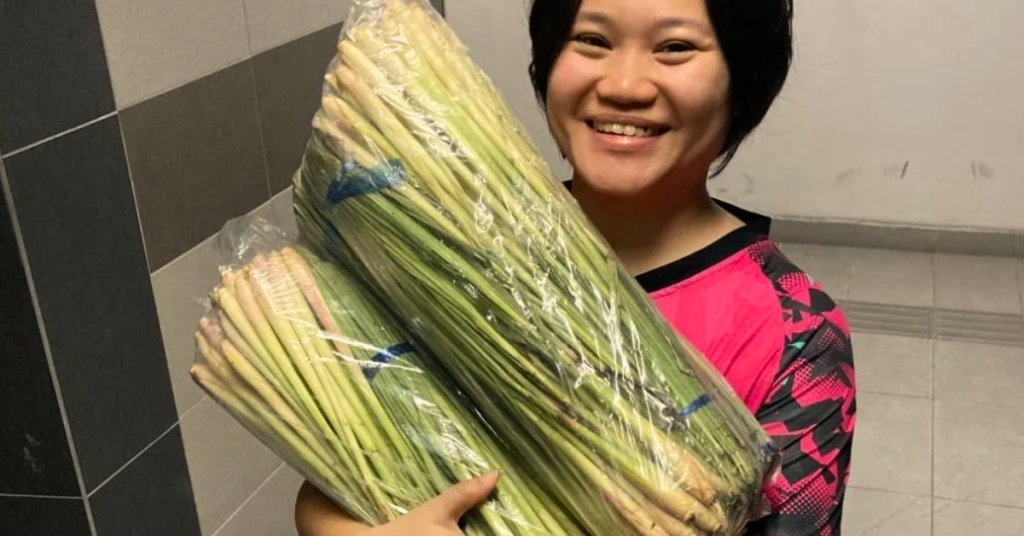
“When I push, I do get sales and orders, but the problem is I cannot keep up with the demand,” she explained. “I have production issues.”
The main issue is that she doesn’t have a steady supply of lemongrass. Eunice has yet to identify a very stable source yet for the specific size and quality she wants.
A solution she’s working on is to commission a farmer, but for now, she has to source from wet markets. But even then, it’s hard to find the quality she wants, and prices have gone up drastically since she started.
There are capacity issues too, but she has hired a part timer to help her with tasks such as sterilisation and packaging so she can focus more on backend and R&D efforts.
In terms of operations and management, she has also just rented the ground floor unit of a shop lot, but many things are broken.
Once these are sorted, she can go all out with marketing, leveraging her decade of experience and wealth of playbooks to get Otsate out there.
“It’s pure chaos, but at the same time, pure bliss”
When asked about when the right time is to become an entrepreneur, some might say something like, ‘you will know when you know’. Eunice finds this to be too generic, though. Her practical advice? Consult your numbers.
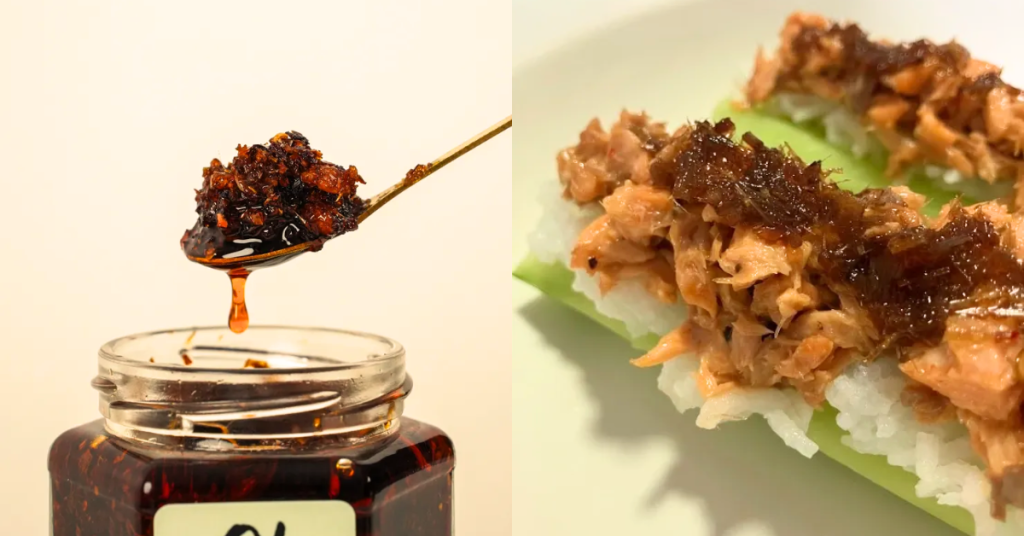
What’s your burn? What’s your runway? How much cash do you have?
“This is something I regret—I wasn’t very meticulous with my numbers,” she said.
Starting out, she didn’t source for the cheapest suppliers, or find the most cost-effective way to do things.
“Now that I don’t have a steady paycheck coming in, I’m starting to realise the pinch in my pocket,” she said.
Once it makes sense financially, that’s when you might want to bite the bullet and go all-in. But on a more personal level, Eunice said that it comes down to the vision in your head.
“The vision in my head was I couldn’t see myself in corporate. It’s not the life I envisioned for myself,” she said.
Instead, the life she saw was one with location freedom, where she could work anywhere and anytime. She also felt like the role she was being boxed into wasn’t suitable for her dynamic personality anymore.
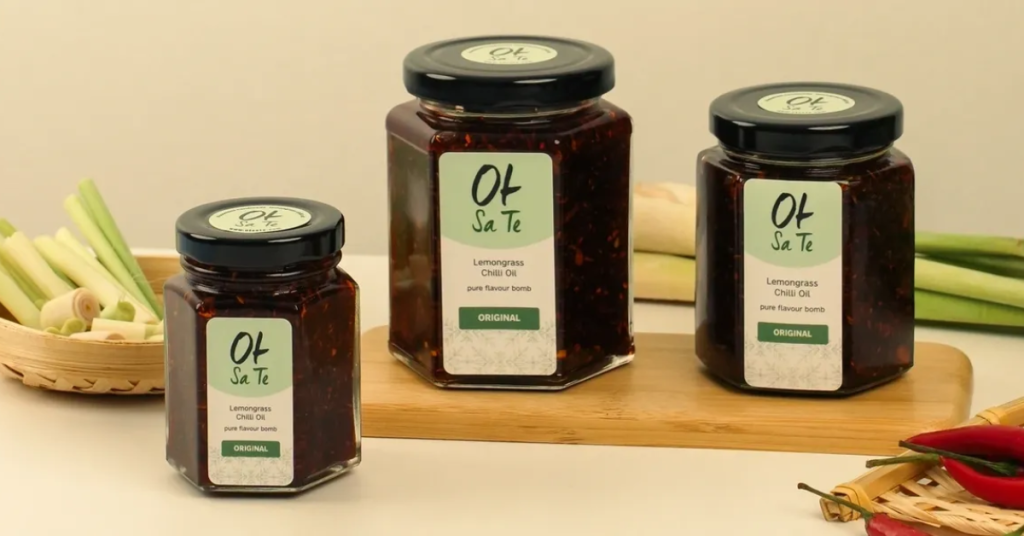
Envisioning the next few years, Eunice hopes Otsate can be exported to countries like Indonesia, Singapore, and even the UK.
To achieve that dream, though, she must now focus on production and getting that steady supply of lemongrass.
Being a full-time entrepreneur now, Eunice is able to enjoy perks like freedom and flexibility. But on the flip side, there are issues like grumpy landlords and self-discipline to tackle.
“The journey is made that much sweeter when customers really appreciate the products.”
It’s no walk in the park, but it’s the path that Eunice has chosen to take, and that makes all the difference.
Also Read: 5 AI features in ASUS’ new OLED laptop & how they’ll benefit your productivity & gaming
Featured Image Credit: Otsate

